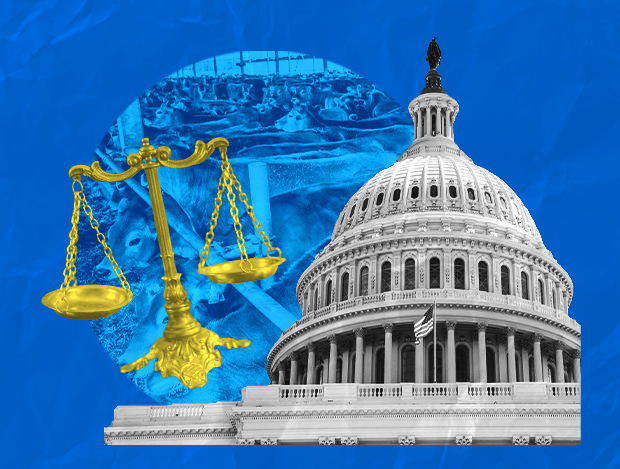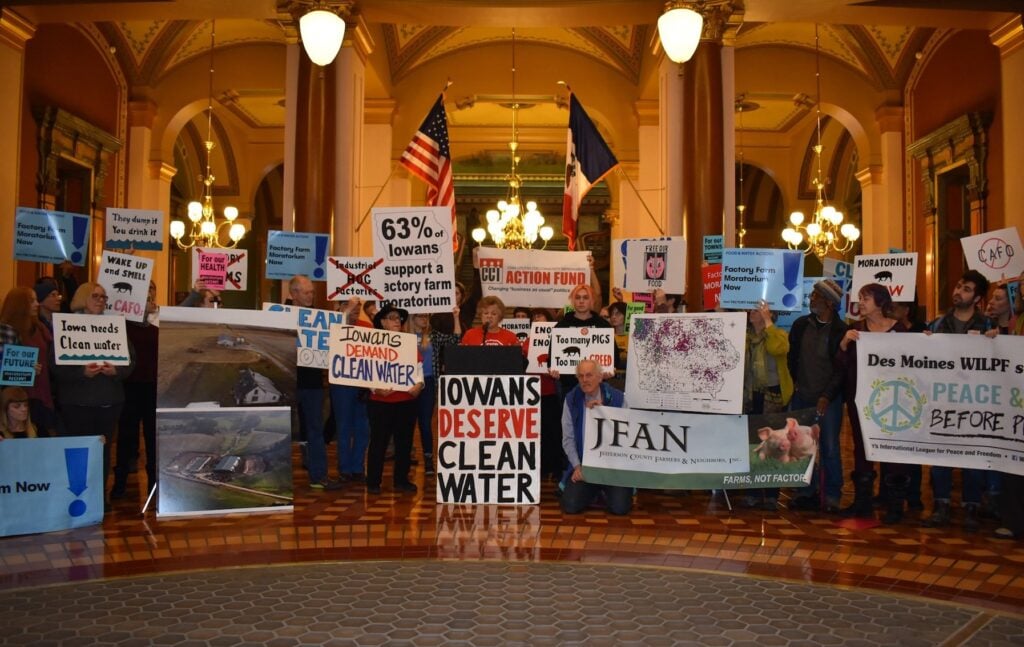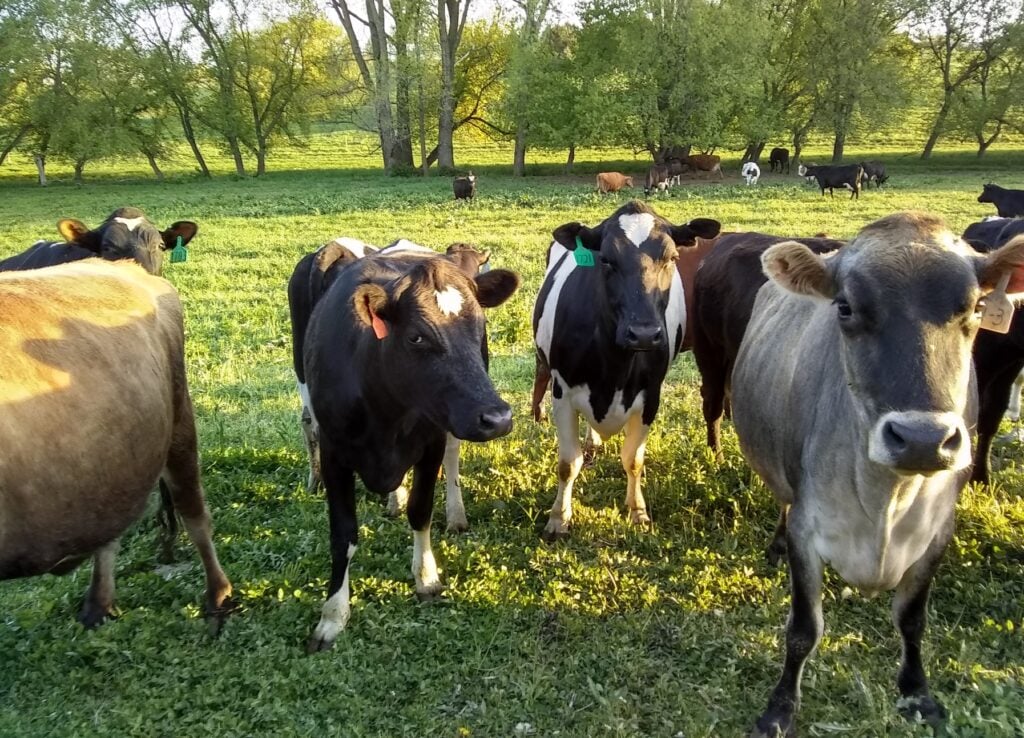3 Policy Changes We Need to Fight Factory Farms
Published Nov 22, 2024

For decades, U.S. policy has promoted polluting factory farms and Big Ag megacorporations. We can change that with policies that put people over profit.
Editor’s note: This article is adapted from “How to Fight a Factory Farm,” a four-episode podcast series featuring Food & Water Watch, produced by the Institute for Agriculture and Trade Policy (IATP).
Food & Water Watch, IATP, and state grassroots groups Missouri Rural Crisis Center, Dakota Rural Action, Iowa Citizens for Community Improvement, and Minnesota-based Land Stewardship Project are part of the Campaign for Family Farms and the Environment (CFFE). CFFE combines grassroots community organizing with state and national advocacy. Together, we work to stop factory farms and push for a fair food system.
You can learn more about the harms of the factory farm system, winning campaigns from CFFE members on the ground, and the policy solutions we’re fighting for by listening to “How to Fight a Factory Farm” here.
Barb Kalbach is a fourth-generation farmer in Central Iowa, and she has seen the state’s agricultural system transform in just a few decades. “I grew up with hogs, cattle, chicken, and a few milk cows,” Barb remembers. During that time, farmers typically raised a variety of livestock and grew a variety of crops.
But today, a destructive model of animal agriculture has made farms like this increasingly rare. The factory farm industry, which raises thousands, even millions of animals in tight confines, has exploded. Now, there are 1.7 billion factory-farmed animals in the United States. And they produce twice as much waste as the country’s human population.
Factory farms — also called CAFOs, or concentrated animal feeding operations — flood nearby communities with nauseating fumes. Their waste pollutes beloved lakes and vital drinking water sources.
They are also deeply enmeshed with the overproduction of corn and soy for feed, which has transformed the Midwest’s landscape and further fueled water pollution crises. The industry devastates rural economies and pushes out small- and medium-sized family farms.
All of this is not inevitable, nor an accident. “We’re getting the type of animal production and agriculture in the food system that our policies are designed to deliver,” says Frank James, executive director of Dakota Rural Action.
Decades of bad policy have allowed factory farming — and the megacorporations that control it — to grow. Small- and medium-sized farmers, working families, and rural communities are being sacrificed for Big Ag’s profits. But just as policy got us into this mess, policy can get us out. Here are three policy changes we need to fight factory farms and foster a fair, sustainable food system.
1. We Need to Level the Playing Field for Farmers with Antitrust Enforcement
Before the factory farm model, raising livestock provided farmers with a more secure livelihood. In the hog industry, farmers sold their animals to the highest bidder at buying stations. “It was a competitive, functioning marketplace,” remembers Rhonda Perry, a fifth-generation farmer and executive director of Missouri Rural Crisis Center. This kept farmer incomes sustainable.
However, this system has collapsed in recent decades. The growth of vertically integrated factory farms, suppliers, and processors has pushed smaller independent operations out of business. According to Barb Kalbach, there haven’t been buying stations in her area since the early 2000s.
Instead, many farmers’ only option is to sell to a massive meat corporation like Smithfield, JBS, and Tyson. And the lack of competition allows the corporations to call the shots.
They’ve used that power to mandate more and bigger industrialized operations while paying bargain-bin prices to farmers. The result has been devastating for rural communities and family farms. For example, in just four decades, Iowa lost 90% of its hog farms. Meanwhile, the number of hogs raised in the state grew dramatically.
We have laws to foster more competition and combat the unfair and unhealthy expansion of corporate power. These antitrust laws, like the Packers and Stockyards Act, were meant to encourage fair business practices, as well as prevent mergers that would concentrate power in bigger and fewer companies.
But decades of weak enforcement have led to today’s crisis of endemic corporate power and factory farming. Big Ag has grown unchecked. It has forced small- and medium-sized farms out of the market in droves, and it has forced those that remain into harmful, industrialized practices.
To solve this crisis, we need a flourishing marketplace where lots of businesses compete on a level playing field. To that end, our government needs to rein in Big Ag by stopping megamergers and enforcing our antitrust laws as they were intended.
Learn more about the factory farm system and how we can stop it in IATP’s “How to Fight a Factory Farm.”
2. We Need Regulations to Rein in Factory Farm Pollution
“CAFOs have helped empty out the countryside. I mean, nobody’s going to build their house next door to a CAFO,” says Barb Kalbach, now a member of Iowa Citizens for Community Improvement (ICCI).
She first got involved in the fight against factory farms when someone tried to build one near her home. Barb and her community successfully stopped it — and all the problems they knew it would bring.
Concentrating all those animals — and all their waste — into such a small space has physical impacts on nearby communities. Sickening stenches and polluted, undrinkable water are just two common ones.
Despite these known issues, factory farms are built and managed with shockingly little regulation. No industry has escaped environmental regulation for air and water pollution like the ag industry.
This applies to the local, state, and federal levels. For example, the federal Clean Water Act is supposed to protect our water from polluters. Yet, factory farms have long received a free pass, reinforced by weak state regulations. Fewer than a third of the country’s 21,000 largest CAFOs have Clean Water Act pollution permits, which are supposed to reduce and monitor for pollution.

At the same time, state and local laws open the floodgates for factory farms to build with little oversight. Iowa’s 1996 HF 519, for instance, made it easier for factory farms to get construction permits and established weak penalties for manure pollution, among other measures.
Factory farm companies are exploiting these weak regulations to expand. “They’re expanding so fast, so close, in some of these communities,” says Vanessa Namken, a member of Dakota Rural Action who organized to stop a factory farm near her home. “We need better regulations because that’s why they’re coming: we don’t have regulations, we don’t have oversight, and we don’t have enforcement.”
Local, state, and federal policy must hold factory farms accountable for their harms, including by enforcing the Clean Water Act as it intended.
3. We Need Incentives to Support Farmers, Not Corporations
U.S. farm policy has for decades created a system that rewards faster, bigger, cheaper. This has benefited corporations at the expense of animals, farmers, workers, and the environment.
For example, we used to have programs that kept the production — and prices — of commodities like corn and soy steady. Now, however, federal policies encourage rampant overproduction, in great part to supply factory farms with cheap feed.
Government programs also incentivize the overproduction of animal products, like milk, for export. This enriches corporations but causes milk prices to plummet, making it harder than ever for smaller dairy farmers to make a living.
Bonnie Haugen, a Minnesota farmer and member of the Land Stewardship project, has been raising dairy cows on pasture — not a factory farm — for 30 years.
“This is the first year we decided not to ship milk,” she says. “The milk prices are so uncertain. Maybe one year, milk prices are good, and they might be good enough to keep you going. But not good enough to really get ahead.”

Moreover, taxpayers are footing the bill for programs that incentivize factory farms. The Department of Agriculture’s Environmental Quality Incentives Program pays factory farms to install digesters, which turn manure into methane gas. The industry poses this factory farm gas as a “sustainable” energy source, but it can actually worsen climate, air, and water pollution.
These supports are expanding the factory farm industry. “To make more methane, you need more manure, and to make more manure, you need more animals,” says Frank James. The truth is, if you start paying factory farms to pollute, they’re never going to stop polluting.
Right now, factory farm gas is getting more government support than ever. This needs to end, as do incentives for overproduction. Instead, we should be helping farmers grow sustainably and transition away from the factory farm model.
Policy Got Us Into This Mess — Policy Can Get Us Out
The factory farm model’s supposed benefit is its “efficiency.” But what it’s really best at is efficiently generating profits for corporations, while harming our environment, health, and communities.
During the COVID-19 pandemic, corporations like Tyson pushed prices — and their own profits — to new heights. Corporate power and corporate greed are key contributors to today’s food affordability crisis.
But these are all borne of policy choices. Our governments can and must make different choices.
For example, in Iowa, Food & Water Watch is working with Barb Kalbach and ICCI to pass the Clean Water Act for Iowa. This bill would require pollution permits and monitoring for the state’s largest factory farms (currently, less than 4% are regulated). It would finally start holding factory farms accountable for their pollution in Iowa.
At the national level, CFFE is pushing for laws like the Farm System Reform Act. This would stop the construction of new factory farms and help farmers transition out of that system.
We’re also advocating for programs that keep production and prices steady and for an end to incentives for factory farms and unchecked corporate power.
CFFE is calling out the use of public dollars and public policy to support factory farms and the multinational meatpacking giants they serve. We’re building public support for reforms to level the playing field for family farm livestock producers.
This fair, sustainable, and healthy food system is possible. And we’re working to build the grassroots power to make it happen.
Food & Water Watch works with allies on the ground and in the halls of Congress to fight for families, farmers, and a fair food system. Get our latest updates in your inbox.
Enjoyed this article?
Sign up for updates.
TO TOP


